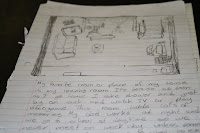

Hello everyone again, its Ellie and I want to share with you all the work that we have been doing in Ms. Engel's 10th grade IB classroom at Northeast High School.
First, let me tell you a little about what we do each week. Every class begins with either a chant or meditation exercise. We also conduct a free write activity where we have been known to write about sweat (hey it was a hot day in September... last period), write nonsense sprinkled with a few words about freedom, oppression, and bacon (Illot Mollot), and the latest exercise was about circles. All of this writing is really about us learning how to break down the barriers of what we think poetry is as well as getting ourselves writing about stuff that we see and are surrounded with every day, but doing it in creative ways. Take the normal, think about it critically and create magic. I feel I can go that far with this because what the students have shared and written with me has been nothing short of spectacular!
We also have been spending time learning about traditional and contemporary Arab poets and poetry. We have read poems and spent many class periods on Suheir Hammad, Naomi Shihab Nye, Al-Munsif Al-Wahaybi, and 'Enayat Jaber just to name a few. What we have taken from these poets has ranged from learning about identity to examining individual words like peace to learning about what our homes and families look like.
With these lessons, we have taken our own route to writing about identity. We have been writing our own poems, water poems. What we have been discovering over the last few months by studying Arabic poetry and what the students have migrated to through their own writing and questioning is discovering their own sense of identity. The students in this school bring a wealth of diversity to this area and we have been defining what that means by attempting to define not only what it means to be who we are, but what it means to be who we are in our space, in this case, Northeast Philadelphia high school students.
What a water poem does is tell about each student's journey from birth to where they are now. Their journey reflected by the movement of water, by the importance of water, by the life-giving quality of water.
I promise that in the next few weeks, I will share some of the magic and pure honesty that has been written by our IB students. In the meantime, I'll give you a few snippets of the free-write exercises.
Thanks for your time and enjoy!
1. I used to be scared of dogs,
But now I’m scared of this world.
I used to love the world,
But now I love myself.
I used to run to school,
But now I just walk.
I used to seek the meaning of life,
But now I know what life is.
I used to live in one place,
But now I live in a different one.
I used to have a place surrounded by nature,
But now I barely see the nature.
I used to wake up hearing birds,
Now they’re gone.
2. My great struggle-
Homesickness.
Born
Raised
In
Poland
But three years ago I came here.
Still, I miss my homeland.
I am a patriot of my country
So its even harder for me.
I not only miss my country
I miss my family.
I struggle.
I feel.
I feel like leaving.
I feel like leaving everyday.
Leaving everything behind.
Coming home.
Believe it or not,
Even the happiest face sighs.
3. A quick sketch on my struggles:
Enter some part of my life,
The other side of the macabre of pain.
Pretty basic.
I think you can handle it.
Here I go.
Abusive father’s hands like magnets
Feels like a thousand beehives
Freeing millions of bees
upon my skin.
My younger brother cries hysterically
Shaking his last nerve
While the heart beats to an extreme rhythm-
A fast tempo.
Stuff at an early age?
Yes, possibly, no?
Confined with a sin
A moral,
A sin.
Where my confession feels plagued
Guilt drives my conscience to sweat
A drop of sweat down my back.
I pray, I ask for strength
For preservation
Because it’s not healthy to
Go look upon the waters
Of contemplation
Beneath the Ben Franklin Bridge.



















